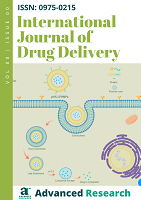Formulation and evaluation of piroxicam suppositories
Keywords:
Piroxicam, In vitro evaluation, Macromelting range, Water soluble bases, SuppositoriesAbstract
Piroxicam suppositories were prepared by using water soluble and oil soluble suppository bases. All the prepared suppositories were evaluated for various physical parameters like weight variation, drug content and hardness, melting point, disintegration and macromelting range. Invitro release study was performed USP type I apparatus using Sorensen's phosphate buffer pH 7.4 as dissolution media. The suppositories prepared with water soluble bases were within permissible range of all physical parameters. In vitro drug released from water soluble bases (hydrous PEG and anhydrous PEG) was greater than that from oil soluble bases.
References
Goodman DO. Pharmacokinetics: Disposition and
metabolism of drugs. In: Munson PL, Muller RA,
Breese GR. editors. principles of pharmacology.
st ed. New York: Chapman and Hall; 2001. p. 47
Sanyal P, Roy G. Preparation and evaluation of
suppositories of paracetamol. East Pharma 2001;
:95-7.
Nair L, Bhargava HN. Comparison of in vitro
dissolution and permeation of fluconazole from
different suppository bases. Drug Develop Ind
Pharm1999; 25:691
Akala EO, Adedoyn A, Ogunbona FA.
Suppository formulations of amodiaquine: In vitro
release characteristics. Drug Develop Ind Pharm
;17: 303-7
Borne RF. Nonsteroidal anti-inflammatory agents.
In: Williams AD, Lemke LT, editors. Foye's
principle of medicinal chemistry. 5th ed.
Lippincot William and Wilkins; 2002. p. 751-93.
Guttadauria, M. The clinical pharmacology of
piroxicam. Acta Obstet. Gynecol. Scand. Suppl.,
, 138:11-13.
Lippincotf's Illustrated Reviews: Pharmacology,
Second Edition. by Mary J . Mycek, Richard A.
Harvey and Pamela C. Champe. Lippincott -
Raven Publishers, Philadelphia, PA O 1997 page
Suleiman MS, Najib NM. Release of
indomethacin from suppository bases. Drug
Develop Ind Pharm 1990;16:707-17.
The British pharmacopeia,The Pharm. Press.
London. 350, 624(1993).
Coben LJ, Herbert A. Lieberman eds In: Theory
and practice of Industrial Pharmacy, Varghese
publishing house, Bombay, p 585-87.
C J de Blaey, J J Tukker eds In: Michael E.
Aulton’s Pharmaceutics the science of dosage
form design Churchill livingstone 1988, p 418-19.
Gold M, Nepuri M, Lawrence H. Suppository
development and production. In: Liberman HA,
Riger MM, Banker GS, editors. Pharmaceutical
dosage forms: Disperse system. Vol. 2. 2nd ed.
New York: Marcel Dekker Inc; 1996. p. 473.
S. Verheyen. Mechanism of increased dissolution
of diazepam and temazepam from polyethylene
glycol 6000 solid dispersions. Int. J Pharm. 2002;
: 45-58.
S. Riegelman, and W.L. Chiou, "Increasing the
Absorption Rate of Insoluble Drugs," US Patent
, 1978.
Betageri G.V., Makarla K.R.. Enhancement of
dissolution of glyburide by solid dispersion and
lyophilization techniques. Int. J Pharm.1995; 126:
-160






